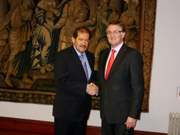UNI demands change in Colombia

In 2010, one trade unionist was murdered each week and thousands of others subject to threats and intimidation. From 1986 to today we are approaching the dramatic and tragic milestone of 3000 murdered trade unionists.
The UNI Americas Executive has been joined by the UNI World Women’s Committee members, whose presence has touched everyone.
The packed opening session included UNI’s 13 Colombian affiliates. Colombian Vice President Angelino Garzón sent his regrets as he had to withdraw from the program at the last minute.
Garzón’s spokesman, Oscar Gutiérrez, read out a statement to the 200 people present.
Colombia has had a new government since last August. The participants listened attentively, waiting to hear a message of change. The message conveyed was the government will bring its laws into compliance with the ILO, is committed to the development of social dialogue, will devote more resources to protection of trade union leaders, will launch a new national dialogue on respect for human rights and will change laws on outsourcing and the use of laws on labour cooperatives.
The latter has brought massive worker abuse as workers lose their employee status and become self employed through the legal fiction of cooperatives. Companies also use another legal loophole where so-called collective pacts offer better conditions to workers if they agree to abandon union membership.
Gutiérrez observed that the frequency of attacks on trade unionists had declined since the government came to power but remained unacceptable. The government confirmed that more resources would be devoted to protecting union members and to investigate the thousands of crimes committed against them.
The presentation brought a sharp response from the three presidents of the three trade union centres in Colombia: Julio Roberto Gomez, CGT; Luis Miguel Morantes, CTC; and Tarcisio Mora, CUT. While they welcomed the change of tone in recent months, they said violence and hostility towards unions continue and workers need change, not promises.
The union leaders decried the impunity with which murderers roam the streets. Four trade union leaders have been murdered in 2011 alone. All of the union presidents pointed out that multinationals exploit the legal environment in which, as one described, "It is easier to form a paramilitary organisation than a union."
UNI General Secretary Philip Jennings said the world is waiting for a new chapter to open in Colombia. The Vice President had been visiting UNI members in several countries with a message of change. UNI is yet to be convinced.
Jennings met with the Colombian affiliates who said no change has been seen on the ground.
Jennings made a call to action to change the rotten labour relations culture in the country. In a letter to the government he proposed that the government invite UNI affiliates and the key local and global companies from UNI sectors to agree a social pact to halt the epidemic of anti-union behaviour.
He spoke of UNI’s distress at the murder of local bank union leader Leonidas Gomez in March 2008 and the complete absence of any adequate investigation by the Colombian authorities. Ninety-eight percent of the 2850 murders of trade unionists remain unsolved.
In Colombia today only 4 percent of workers are members of a union and just 3 of the 18 million member work force are covered by any kind of collective agreement.
The UNI Americas executive runs until April 8. It will be followed by a Breaking Through organisers’ forum that will bring together frontline organising staff from throughout the Americas.
Photos: Philip Jennings and a UNI delegation meet with Colombian Vice President Angelino Garzón.

